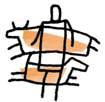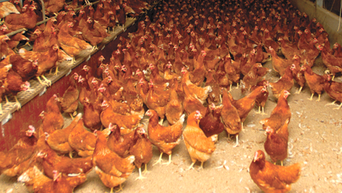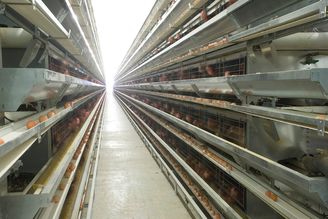GENETIC AND PHENOTYPIC PROFILES OF HENS THAT PILE
Smothering is a global concern for hen welfare. Estimates suggest that smothering causes 16% of all mortality in commercial flocks in Australia (PRJ-1HS901UM) and the UK (DEFRA, 2015). Behavioural observations conducted during a recent Australian investigation (PRJ-1HS901UM), showed that particular bird characteristics were associated with smothering; specifically, curiosity and fear of novelty and humans. This project aims to Identify the genetic and phenotypic characteristics associated with hens that frequently to reduce the incidence of piling behaviour and smothering in laying hens. And to contribute to international efforts to select optimal hens for cage-free environments. Such that, this project, funded by Australian Eggs, will be part of an ongoing phenotyping effort from which data on specific animals and sire lines can be directly implemented into commercial breeding using the data pipeline established by the funded HenTrack effort managed by Dr Michael Toscano and the team at the University of Bern.
Investigators: Peta Taylor, Maxine Rice, Paul Hemsworth, Kym Butler & Michael Toscano (University of Bern).
For further details, please contact Peta Taylor.
Smothering is a global concern for hen welfare. Estimates suggest that smothering causes 16% of all mortality in commercial flocks in Australia (PRJ-1HS901UM) and the UK (DEFRA, 2015). Behavioural observations conducted during a recent Australian investigation (PRJ-1HS901UM), showed that particular bird characteristics were associated with smothering; specifically, curiosity and fear of novelty and humans. This project aims to Identify the genetic and phenotypic characteristics associated with hens that frequently to reduce the incidence of piling behaviour and smothering in laying hens. And to contribute to international efforts to select optimal hens for cage-free environments. Such that, this project, funded by Australian Eggs, will be part of an ongoing phenotyping effort from which data on specific animals and sire lines can be directly implemented into commercial breeding using the data pipeline established by the funded HenTrack effort managed by Dr Michael Toscano and the team at the University of Bern.
Investigators: Peta Taylor, Maxine Rice, Paul Hemsworth, Kym Butler & Michael Toscano (University of Bern).
For further details, please contact Peta Taylor.
REDUCING ABNORMAL BEHAVIOURS THROUGH EFFECTIVE ENRICHMENT
Breeding roosters and hens in the meat chicken industry can display abnormal behaviours such as feather licking, feather pecking and feather eating. The expression of such abnormal behaviours have been associated with stress, reduced welfare states and poor performance. Environmental enrichment can minimise such abnormal behaviours. However, environmental enrichment must be effective for it to be truly beneficial. There has been little investigation into the effectiveness of environmental enrichment for breeding chickens in the chicken meat industry, particularly research with a focus on behavioural improvements. This project, funded by Poultry Hub, aims to understand the challenges and limitations to providing specific enrichment for meat chicken breeders in Australian commercial conditions via industry wide phone and online consultation and farm visits and to identify a practical, economic, effective on farm environmental enrichment that reduces abnormal behaviours.
Investigators: Peta Taylor, Paul Hemsworth, Natalie Morgan (Curtain University), Carolyn Dekoning (SARDI).
For further details, please contact Peta Taylor.
Breeding roosters and hens in the meat chicken industry can display abnormal behaviours such as feather licking, feather pecking and feather eating. The expression of such abnormal behaviours have been associated with stress, reduced welfare states and poor performance. Environmental enrichment can minimise such abnormal behaviours. However, environmental enrichment must be effective for it to be truly beneficial. There has been little investigation into the effectiveness of environmental enrichment for breeding chickens in the chicken meat industry, particularly research with a focus on behavioural improvements. This project, funded by Poultry Hub, aims to understand the challenges and limitations to providing specific enrichment for meat chicken breeders in Australian commercial conditions via industry wide phone and online consultation and farm visits and to identify a practical, economic, effective on farm environmental enrichment that reduces abnormal behaviours.
Investigators: Peta Taylor, Paul Hemsworth, Natalie Morgan (Curtain University), Carolyn Dekoning (SARDI).
For further details, please contact Peta Taylor.
WHAT CAUSES SMOTHERING IN COMMERCIAL FREE-RANGE LAYING HENS?
There are limited overseas reports on the incidence of smothering in free-range laying flocks which suggest that smothering may account for a substantial proportion of overall mortality.
While a wide range of potential variables have been implicated, there have been few systematic studies on smothering because outbreaks are sporadic and unpredictable and detection is normally after the incident. Anecdotal reports in the Australian free-range industry suggest that up to 30-40% of mortality of adult birds may be due to smothering.
An understanding of the relationships between environmental characteristics and flock characteristics (e.g. such as physical conditions and behavioural characteristics such as fear and exploration during rearing and in adulthood) and smothering events is likely to lead to benefits for both hen welfare and farm productivity.
Working with collaborators from the University of New England (UNE), this project is funded by Australian Eggs and will conclude in 2021.
Investigators: Paul Hemsworth, Andrew Fisher, Mark Stevenson and Peta Taylor (UNE).
For further details, please contact Paul Hemsworth.
There are limited overseas reports on the incidence of smothering in free-range laying flocks which suggest that smothering may account for a substantial proportion of overall mortality.
While a wide range of potential variables have been implicated, there have been few systematic studies on smothering because outbreaks are sporadic and unpredictable and detection is normally after the incident. Anecdotal reports in the Australian free-range industry suggest that up to 30-40% of mortality of adult birds may be due to smothering.
An understanding of the relationships between environmental characteristics and flock characteristics (e.g. such as physical conditions and behavioural characteristics such as fear and exploration during rearing and in adulthood) and smothering events is likely to lead to benefits for both hen welfare and farm productivity.
Working with collaborators from the University of New England (UNE), this project is funded by Australian Eggs and will conclude in 2021.
Investigators: Paul Hemsworth, Andrew Fisher, Mark Stevenson and Peta Taylor (UNE).
For further details, please contact Paul Hemsworth.
ANIMAL WELFARE AND VALUES
This project, funded by Australian Eggs Limited is working with a panel of experts in animal welfare science, veterinary science and social science to identify and describe values based elements that arise in the context of the available frameworks for animal welfare, allowing for rational assessment and productive engagement on hen welfare issues.
Working with collaborators from the University of Adelaide (UA), the University of Western Australia (UWA) and a private consultant, this project concluded in 2019.
Investigators: Andrew Fisher, Paul Hemsworth, Rachel Ankeny (UA), Heather Bray (UWA) and Hugh Millar.
For further details, please contact Andrew Fisher.
This project, funded by Australian Eggs Limited is working with a panel of experts in animal welfare science, veterinary science and social science to identify and describe values based elements that arise in the context of the available frameworks for animal welfare, allowing for rational assessment and productive engagement on hen welfare issues.
Working with collaborators from the University of Adelaide (UA), the University of Western Australia (UWA) and a private consultant, this project concluded in 2019.
Investigators: Andrew Fisher, Paul Hemsworth, Rachel Ankeny (UA), Heather Bray (UWA) and Hugh Millar.
For further details, please contact Andrew Fisher.
HEN WELFARE LITERATURE REVIEW
This project will conduct a review of the scientific literature of laying hen welfare with an emphasis on the relevance of the literature in relation to Australian conditions since this review will be used to inform current welfare discussions and future investment in welfare research and development by Australian Eggs Limited. This review will focus on the main housing, management (at both the farm and stockperson levels) and husbandry practices that have implications for hen welfare.
This Australian Eggs Limited funded project concluded in 2019 involved major collaboration from prominent Australian poultry researchers and veterinarians. Animal Production Science will publish a special issue in February 2020 comprising reviews/chapters from the review on layer hen welfare, funded by Australian Eggs Limited.
Investigators: Paul Hemsworth, Andrew Fisher, Ellen Jongman, Lauren Edwards and Amir Noormohammadi.
For further details, please contact Ellen Jongman.
This project will conduct a review of the scientific literature of laying hen welfare with an emphasis on the relevance of the literature in relation to Australian conditions since this review will be used to inform current welfare discussions and future investment in welfare research and development by Australian Eggs Limited. This review will focus on the main housing, management (at both the farm and stockperson levels) and husbandry practices that have implications for hen welfare.
This Australian Eggs Limited funded project concluded in 2019 involved major collaboration from prominent Australian poultry researchers and veterinarians. Animal Production Science will publish a special issue in February 2020 comprising reviews/chapters from the review on layer hen welfare, funded by Australian Eggs Limited.
Investigators: Paul Hemsworth, Andrew Fisher, Ellen Jongman, Lauren Edwards and Amir Noormohammadi.
For further details, please contact Ellen Jongman.



